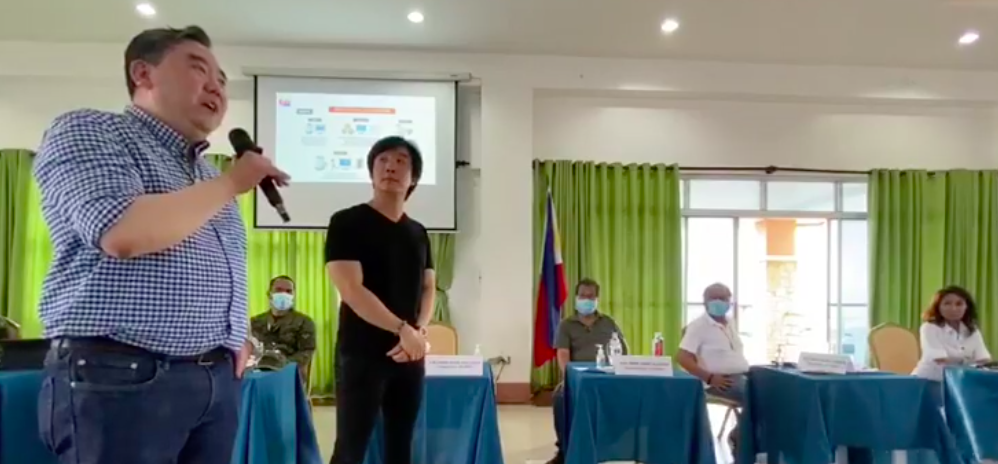
Edmund Liu of Bayanihan Cebu Ph and RDC Chair Kenneth Cobonpue explain to the mayors of Cebu province the mechanism of the private sector-led strategized testing before their employees will return to work. | Screengrab from the video of the meeting with the mayors)
CEBU CITY, Philippines — The strategic rapid diagnostic testing for employees in the private sector has yet to begin as discussions continue as to what portion of the workforce needs to undergo testing.
The rapid antibody testing in the private sector is a component of the Office of the Presidential Assistant for the Visayas (OPAV)-initiated Project Balik-Buhay (PBB). The project is also in partnership with the private sector, the Department of Health in Central Visayas (DOH-7) and the local government units of the cities of Cebu, Mandaue and Lapu-Lapu that are also conducting a strategic mass testing.
The mass testing for employees will be shouldered by their employers as part of the precautionary measures before their businesses resume operations if quarantine protocols will already be relaxed.
The strategic testing in the private sector was supposed to start last May 14, 2020, based on the original timeline of the PBB.
“As to the private sector, it is still ongoing ang discussion on what would be the percentage in terms of i-test nga mga empleyado. Kato ba tanan nga nagtrabaho na, o kaya naman katong mga tawo nga dapat ni-report na sa opisina or i-include ba kadtong work from home,” DOH-7 chief pathologist Dr. Mary Jean Loreche said in a virtual presser on Saturday, May 16.
(As to the private sector, it is still ongoing, the discussion, on what would be the percentage in terms of the employees to be tested. All of the employees who are working or only those workers who should report to work in the office or do we include those working at home.)
Dr. Loreche said there is a “stretch” in the projected timeline of the PBB considering that the community testing phase of the PBB in the tri-cities was also pushed back to May 6 instead of the original schedule on May 4.
Businessman Edmund Liu of Bayanihan Cebu PH and Regional Development Council (RDC-7) Chair Kenneth Cobonpue, during a meeting with Cebu province mayors last Friday, May 15, said companies had already committed to funding for the rapid testing of their employees.
Liu said that aside from the initial testing which would cover all employees, there would be a regular randomize testing to “vigilantly monitor” the health of their employees.
“There will be guidelines for that (private sector rapid testing), and I think we will be discussing that in the coming days once we will be finished with the community testing,” Loreche said.
“Dili man namo gusto man gud nga i-overlap silang duha primarily because we want to have a better view sa komunidad bago ang sentro sa negosyo,” the doctor added.
(We don’t want the community testing and the rapid testing in the private sector to overlap primarily because we want to have a better view of the community before we focus on the businesses.)
Loreche, however, did not give a new timeline as to when the private sector would most likely begin testing.
Read more: Lapu’s COVID-19 ‘sweeper rapid testing’ starts on May 16
The schedule for the community testing in the tri-cities was supposed to end on Friday, May 15, but the low turnout in the collection of sampling, particularly in Cebu City has forced the PBB to extend the sampling period.
As of May 15, only 6,205 blood samples were collected in Cebu City in the past 10 days. This accounts for only 35.38 percent of their target sample size of 17,536 which stands for 10 percent of the number of households in the city.
Read more: Mandaue leads in turnout of tri-cities rapid test
Mandaue City, meanwhile, was only short of 71 people before it could have declared a 100 percent accomplishment in the testing. The city logged 11,561 samples collected or 99.39 percent of the 11,632 target.
Lapu-Lapu City, on the other hand, was able to collect 73.82 percent of their target samples or 7,732 out of 10,477.
Loreche said community testing period is extended to three more days where their sample extraction teams will go back to the barangays or areas with lower turnout in order to collect a more widely represented data./dbs